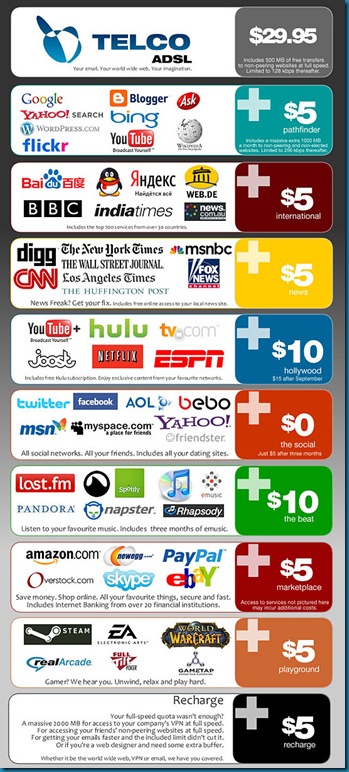Don’t Kill Our Only Democracy – Support Net Neutrality
Contrary to the rallying cries of various grammatically-challenged teabaggers, we have never had a functioning democratic society. If you’re a long-time reader, you may have seen a quote from Chomsky on this page:
Personally, I'm in favor of democracy, which means that the central institutions of society have to be under popular control. Now, under capitalism, we can't have democracy by definition. Capitalism is a system in which the central institutions of society are in principle under autocratic control.
Indeed, the internet is the first and only example we’ve had of a truly globalized forum in which all may enjoy equal participation. The powers-that-be hate this and have tried (will try) everything they can, from firewalls to censorship, to squash it. Net neutrality – the principle that the equality of all internet traffic is protected by the force of law – has been long-resisted as antithetical to the free-market. This is, of course, utter hogwash. It is about far more than whether Comcast can throttle down their competitors bandwidth - at this point the internet underlies so much of our lives that it has become a basic necessity to participating in our global economy.
There is an interesting parallel here with the advent of electricity. While most of us take for granted the ability to plug in our refrigerator, there was a time when power lines were something that only rich people could use, and even then only for their new-fangled light bulbs. Back then, there was nobody who could imagine other uses for it – the idea of using this form of fire to clean your clothes or freeze your food was preposterous. Those who pushed for governmental intervention to ensure equal distribution were decried as socialists. Much as with the internet, for as indispensable as it has become, we quite literally have no idea what the future will bring.
In this day and age, I would say that it's hard to believe that we're still discussing whether net-neutrality is a good thing, but this is what happens when money becomes intertwined with power and influence:
Oddly, dozens of Democrats (perhaps 70 again) have signed a letter supporting the talking points and agenda of Glenn Beck and one his major corporate sponsors, AT&T. This letter also contradicts the technology agenda of Barack Obama, Obama's Federal Communications Commission, and the Democratic leaders of the House and Senate Commerce Committees that oversee the communications industry. The "congressional" letter is being peddled by cable and phone lobbyists to the staff of Democratic Congressmen who have a history of putting their names on cable and phone industry's debunked talking points, sometimes apparently without understanding their meaning.
This letter, being pushed by Rep Gene Green (D-TX), pertains to whether or not the Internet will remain an open engine of economic and democratic freedom. In D.C., legislators and lobbyists are debating something called "net neutrality," which is a common-sense FCC proposal to keep phone and cable companies from interfering with what you can do online and how you can use the Internet. Without net neutrality, phone and cable companies can limit your online speech and freedom. I think the Daily Show explains the issue best (here (with John Hodgman) and here).
For the time being, I think that the net-neutrality debate may suffer from poor branding - the phrase itself reeks of techno-elitist packaging that makes all but the geeky among us sglaze over. But however much you may care about the issue itself, you should know by now that the 21st century is the age of the internet. The series of tubes is not just about watching videos of cats - it is how you talk on the phone, watch TV, do your banking, and participate in our democracy. It is far too important to allow the so-called 'free' market to destroy it through greed. We need to start thinking long-term about having alternate sources of bandwidth just like we have alternate sources of fuel. But in the short-term, we also need to ensure that our fledgling global democracy is not co-opted by those who would destroy it for profit.
With the present structure of cable-TV, is it so hard to imagine the internet's future to be something like this:



![Reblog this post [with Zemanta]](http://img.zemanta.com/reblog_e.png?x-id=94244d26-4966-42e7-a77a-e6dd68830288)









Comments
Post new comment